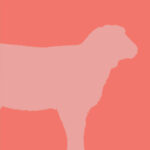
BABYDOLL SHEEP
Often kept as pets, these “smiling” sheep are very docile. While they provide fleece as luxurious as cashmere… they don’t like to get wet!
PROFILE
Spade came to us from a farm in Tennessee that specializes in babydoll sheep.
We also have a few domestic sheep. Eddie is the big white sheep. He is part of the donated trio of animals that included our mini-horse, Violet, and our mini-donkey, Don-Kay. He is mostly white with a long tail. Snow is our pure white, female sheep. She was born during one of the few snowfalls in Lilburn. Due to the conditions she was born into, her mother rejected her and she was brought to us to be raised.
OVERVIEW
CONSERVATION STATUS
Least Concern
AVERAGE SIZE
Compared to a 6′ Man
AVERAGE WEIGHT
Females: 130 – 180 lbs
Males: 190 – 230 lbs
AVERAGE LIFESPAN
12 – 16 Years
DIET
Herbivore
REGIONS
North America,
England
Babydoll Sheep made their way to the United States in the early 1800’s. They originated from the babydoll Southdown sheep of Sussex County, England where they actually became extinct for over 50 years until some were returned in 1999. In England, they remain on the Rare Breeds Survival Trust List.
APPEARANCE
A sweet, teddy-bear type face adorns these medium-size sheep. They appear to always be smiling, that is, until their fleece grows making their eyes and other features difficult to see. Babydoll sheep are almost always white, but they can also be black which is a recessive gene. When black, time in the sun causes the fur to sometimes fade to a dark brown. Their fleece is one of the softest, similar to cashmere. Each spring, the sheep should be sheared allowing a new coat to grow. While short, these sheep are strong and sturdy. At only 18 – 24 inches in height, they can weigh as much as 200 pounds.
CHARACTERISTICS
Babydoll sheep graze on grass, weeds and hay. Babydolls make wonderful “organic” weeders. They are excellent in vineyards as they will not harm fruits, tree trunks or shrubs like goats tend to. They also produce a thick yet soft fleece that is sheared each spring. As it does not scratch or irritate the skin, it is sought after for its softness.
Females are called ewes, males are rams, young are called lambs. They are gentle, affectionate and outgoing in nature each with a distinct personality. They are flock animals and appreciate a companion or two as well as regular interactions with their humans. Their calm, docile disposition has a soothing effect on other livestock.


